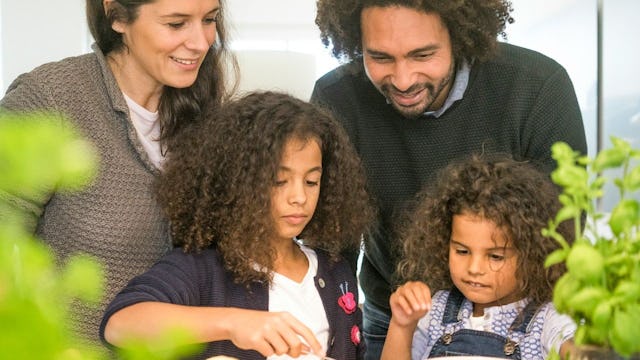Why We Don't Do Family Dinners

Within the walls of our house lies one of our deepest darkest secrets — we don’t own a kitchen table. I know, I know, we’re horrible people.
In American culture, the kitchen table has often been viewed as the epicenter of family communication and togetherness. Just think, how many family-based sitcoms have you seen that don’t prioritize conversation around the dinner table?
When I told my mother that I was giving away our dinner table, she responded as though I’d committed the world’s biggest abomination. She all but said, “WTF kinda people don’t have a kitchen table?!”
I gave her a moment to lose her old school traditionalist mind, and then I told her why. We never eat at the table, our home is a split level so it was really just an eyesore in the middle of the floor because we don’t have a designated kitchen. And lastly, I hate circular tables and one day I wanted a breakfast nook.
She understood the split-level issue, and she even agreed with my preference for a square table with the shape of our home. Still, she had issues comprehending why I wasn’t replacing our table as opposed to simply getting rid of it.
My mother is one of the countless people who envision old school images of American families. We’ve come a long way since the days that folks head 2.5 kids, TV was filled with nuclear white families only, and it wasn’t uncommon for folks to drive a station wagon. I’m not saying all of the changes we’ve made in the last few decades are for the better, but our culture has not remained stagnant.
I think the “families must have dinner at the table” mentality is reflective of our past and overlooks family differences. What constitutes a family? If one member of the family works in nontraditional schedule or is away for long periods of time is it still a family dinner? What about families who have children with special needs? How many qualifiers improve or downplay the impact of this suggestion?
But most importantly, why are we still trying to force ourselves into cookie cutter bonding strategies?
My mother was a single parent of two and we never ate at the table. So, I was pretty shocked at her reaction to us getting rid of ours. But deep down, I believed her reaction stemmed from the belief that there was a certain way to raise a family. As my mother went on about the importance of my son knowing how to eat at the table and not always on the couch with us, I stopped listening and began to wonder.
Why are we so attached to the family dinner idea? Plenty of folks proclaim the benefits of family dinners. And I don’t negate that at all. But have we not evolved enough as a society to understand there’s a wide range of ways to bond with our children?
I’m probably condemning myself to lifelong social isolation with this next admission. But the truth is, I don’t know if we’ll ever get another table. It’s another one of those things that benefits guests but doesn’t have much significance for us as a family.
My children are almost 3 months and 3 years old and I spend a lot of time thinking about the relationships we will develop over the next few years. Sure, I’m as impressionable, as most new parents are, but I’ve never fallen into the trap that the only option I have for love and healthy communication with my children would be the dinner table.
As we live our barbaric tableless lives, we spend a lot of time on the couch and even — gasp! — in the bed, laughing and watching shows together. My son’s smile reinforces my belief that it’s not about the location of togetherness; it’s the presence of it.
I know parents of older children experience a heightened amount of scrutiny about this. A lot of people believe skipping organized “sit at the table” family dinners leaves parents unable to bond with their children. Sure, dinner time table talk is an excellent way to bond with your kids, but there are plenty of other ways. Modern families have moved so far past the traditional “once a day” talks of the Leave it to Beaver days. The dynamic has shifted to help parents have a more personal and authentic relationship with their kids. Instead of bonding over passing the potatoes, we’ve learn to chat on life’s details over a video game, regularly check in via text, and a host of other creative methods of improving the parent-child relationship.
Parents today have learned that making sure your children understand you have an open-door communication policy is more powerful than preserving traditional rituals.
We’re in the early stages of this parenting thing. I know a toddler and an infant don’t have much to talk about yet. Still, I’m here listening, even when it’s just babble. The fruitful relationship I have with my mother has taught me that parent-child bonding isn’t something that can be forced. The most powerful parent-child relationships are those that have the chance to develop organically.
Sure, we may not have a table. But we have an entire house as a potential site for bonding throughout the years.
As our children age and look back on the experience they had, I don’t think they’ll notice a missing table. And even if they do, we’ll be close enough that they would feel comfortable telling us.
Call me a counter-culturalist, but I think we’ll be just fine.
This article was originally published on